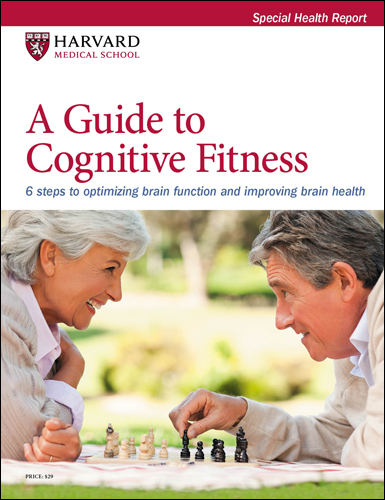Working out your brain
Cardio exercise can build your brain just as it does your muscles.

Cardiovascular exercise, which gets the heart pumping, the muscles moving, and the sweat glands working, is one of the best medicines for overall health. And what’s good for the body also benefits the brain.
"There is no surefire medical tool that can delay the onset of dementia and other memory problems," says Dr. Julie Brody Magid, Clinical Director of the Memory Disorders Assessment Clinic at Harvard-affiliated McLean Hospital. "Certain drugs may help slow mental decline when symptoms arrive. But cardio exercise has consistently proved to help protect the brain from cognitive decline and perhaps even improve cognitive functioning if issues arise."
Popular theories
How does cardio boost your brain? There are many theories. Research has focused on how it can strengthen the heart, promote artery health, improve blood flow to the brain, fight inflammation, and increase key chemicals that encourage new brain cell growth.
For instance, cardio activates a molecule called brain-derived neurotrophic factor (BDNF). BDNF helps repair brain cells and make new brain cells. It’s also been associated with a larger hippocampus, the brain region that stores and retrieves memories.
A study published online Aug. 20, 2021, by Nature Metabolism found that the hormone irisin, produced by muscles during exercise, protected mice against brain inflammation.
The study also suggested that increasing irisin through exercise may help counter the effects of Alzheimer’s disease. (While this was only an animal study, the researchers speculated based on previous research that the effect could work with humans.)
Cardio exercise strengthens the heart and improves blood flow throughout the body, including to your brain, specifically its white matter. This helps protect against vascular dementia caused by reduced blood flow to the brain. Better blood flow also can clear toxins from the brain, further protecting against inflammation and promoting neurogenesis — the development of new brain cells.
Cardio helps even if you have memory issuesIt’s never too late to adopt brain-protecting exercise, even if you show early signs of memory loss. A study published online March 23, 2021, by the Journal of Alzheimer’s Disease looked at how cardio exercise affects people with early cognitive decline. Those who followed a yearlong moderate-to-vigorous cardio program scored better on cognitive tests than those who only did a stretching routine. Specifically, they improved their executive function skills, which involve planning and decision making. Most exercisers did brisk walking, but others did swimming, cycling, or ballroom dancing. They followed a 30-minute, three-day-a-week routine for six months and then increased it to five workouts per week. |
Type doesn’t matter
How much cardio does your brain need? Research continues to explore this question, but it may depend on your fitness level. A 2015 study found that 20 minutes of moderate exercise produced the most significant cognitive boost for nonathletic people. Yet research in the January 2021 Journal of Sports Science found that 45 minutes was ideal for trained cyclists and triathletes.
Until more is known, aim for the recommended federal guidelines of at least 30 minutes of moderate-intensity exercise, five days a week, says Dr. Brody Magid. She suggests that you establish a regimen that is approved by your primary care physician and stick with it.
As for the best type of cardio, again there is no clear winner. However, challenging yourself is vital. "Just like your body acclimates and doesn’t get stronger when you do the same workout all the time, your brain also can get too comfortable with routine exercise," says Dr. Brody Magid.
She suggests mixing up your cardio workouts with varied intervals and trying new, challenging activities whenever possible. If you regularly walk, try swimming. If you cycle, try hiking. Also, consider cardio that includes mental stimulation and challenges. "These offer a two-for-one combination of working your thinking skills while you work out your body," says Dr. Brody Magid.
For instance, non-contact boxing forces you to remember various sequences of punches, so you have to concentrate and stay focused. With racquet sports like tennis or pickleball, you to need to react to shots from an opponent and then plan and execute your return. "The bottom line is that when it comes to the brain and exercise, any movement is better than none, and the more you move, the more you boost and protect your brain," says Dr. Brody Magid.
Image: © Nastasic/Getty ImagesAbout the Author

Matthew Solan, Executive Editor, Harvard Men's Health Watch
Disclaimer:
As a service to our readers, Harvard Health Publishing provides access to our library of archived content. Please note the date of last review or update on all articles.
No content on this site, regardless of date, should ever be used as a substitute for direct medical advice from your doctor or other qualified clinician.
















